High Voltage Fuse Durability

High voltage fuses are critical components in safeguarding electrical systems, designed to operate effectively under various conditions. However, extreme environmental factors such as high temperatures, high humidity, and corrosive atmospheres can challenge their performance and durability. Understanding how these conditions affect high voltage fuses is crucial for ensuring reliable operation and longevity in demanding industrial applications.
Impact of Extreme Environmental Conditions
High Temperature Challenges
High temperatures can significantly affect the performance of high voltage fuses. Materials used in fuse construction, such as the fusible element and insulation, can degrade or change properties when exposed to elevated temperatures, potentially leading to reduced operational life or premature failure. Engineers must consider thermal effects when designing and selecting fuses to ensure they can withstand the temperature ranges of their intended environments.
Humidity and Moisture Effects
High humidity levels introduce moisture into the electrical system, which can lead to corrosion, reduced insulation resistance, and increased leakage currents. In high voltage fuses, moisture ingress can cause deterioration of the insulating materials and affect the fuse's ability to break the circuit under fault conditions, compromising the safety and reliability of the entire electrical system.
Corrosive Atmospheres and Their Consequences
Corrosive environments, often found in industrial areas with chemical exposure or coastal regions with salty air, can accelerate the degradation of fuse components. Corrosion can weaken the structural integrity of the fuse body and the conductive elements, leading to increased resistance, overheating, and, ultimately, fuse failure.
Ensuring Durability in Harsh Environments
Several strategies can be employed to enhance the durability and performance of HV fuses in extreme conditions:
Material Selection: Manufacturers utilize materials with superior heat resistance and corrosion-resistant properties for critical fuse components. Ceramic fuse housings are often preferred due to their excellent insulating properties and resistance to degradation under high temperatures.
Environmental Coatings: Applying protective coatings to the fuse housing can act as a barrier against moisture, dust, and contaminants. These coatings can slow down the corrosion process and extend the lifespan of the fuse.
Derating and Temperature Monitoring: Derating the fuse by selecting a larger size than strictly necessary for the operating current compensates for the reduced capacity under high temperatures. Additionally, installing temperature monitoring systems near HV fuses can provide early warnings of potential overheating issues.
Regular Maintenance and Inspection: Implementing a routine inspection and maintenance program for HV fuses is crucial in harsh environments. Visual inspections can identify signs of corrosion, degradation, or moisture ingress. Periodic testing can verify the fuse's interrupting capability and ensure continued reliable operation.
Operational Considerations and Maintenance
Monitoring and Maintenance Strategies
Regular monitoring and maintenance are crucial for high voltage fuses operating under extreme conditions. Inspections can identify signs of wear, corrosion, or other environmental impacts, allowing for timely replacement or maintenance actions. Implementing condition-based monitoring systems can also help in predicting fuse degradation and planning preventive maintenance.
Lifecycle and Replacement Planning
Understanding the expected lifecycle of high voltage fuses in extreme environments is vital for operational planning. Proactive replacement strategies can minimize downtime and prevent unexpected failures, ensuring continuous and reliable operation of the electrical system.
The durability and performance of high voltage fuses under extreme environmental conditions are critical to the reliability of industrial electrical systems. By addressing the challenges posed by high temperatures, humidity, and corrosive atmospheres through careful design, material selection, and compliance with testing standards, these fuses can effectively protect electrical infrastructure. Regular maintenance and strategic lifecycle management further enhance their reliability, ensuring sustained performance even in the most demanding conditions.




